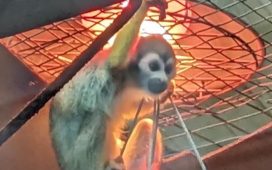The male black eagle that has been a resident of the Walter Sisulu Botanical Gardens since 1988 has still not returned after going missing more than a week ago.
Thulani flew off on June 8 and had not returned by Monday, Gerald Draper, chairperson of the Black Eagle Project Roodekrans, confirmed to News24.
To make matters worse, it has been confirmed that a chick has hatched and is now being cared for by the remaining female eagle, Makatsa.
“The female has been bringing prey to the nest and is feeding the chick, which we confirmed as having hatched on Thursday,” Draper said on Monday.
News24 reported on Thulani’s sudden disappearance over the weekend.
Thulani and Makatsa are an institution in Johannesburg and the subject of great interest worldwide. His disappearance made front-page news in the Afrikaans media on Monday.
“Without the male there, it becomes problematic, because she has to sustain herself as well. His job is to bring prey to the nest and she then feeds [the chicks],” Draper told News24 on Friday.
“So now, the likelihood of her being able to sustain herself and the chicks, as well as protect them, is very low.
“Crows are intelligent buggers, they’ll soon pick up that there aren’t two eagles, so if she goes and looks for prey, the nest will be exposed,” Draper said.
He said Makatsa might decide to “abort”, leaving the nest to look for another mate.
Not unusual
Draper says it is not unusual for an eagle to just take off one day.
“Eagles have been breeding there since the 1940s. So new birds come in all the time. In 1988, the female was sitting on the nest when the male disappeared. Eventually she aborted the chicks and left and came back a few weeks later with a new male, which happened to be Thulani.
“Then, in 2016, the older female disappeared and Thulani came back with Makatsa.”
Draper said Thulani’s disappearance was worrying and sad and that it was unlikely that Makatsa would attempt to raise the chick by herself.
“It’s pretty cold, so the chick will be exposed to that when she leaves the nest, and it will be left open to predators.
“We will continue to monitor the situation and communicate as and when any developments unfold,” Black Eagle Project Roodekrans said in a statement.
Draper said he would provide a full update on Thursday.














